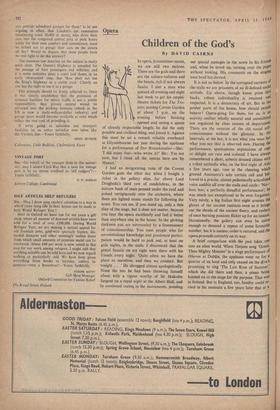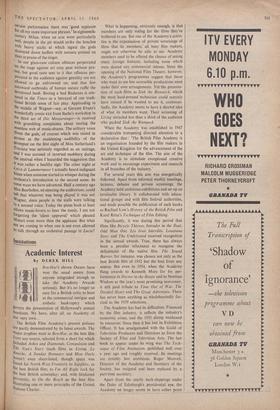Opera
Children of the God's
By DAVID CAIRNS
I had an invigorating taste of the Covent Garden gods the other day when I bought a ticket in the gallery slips, far above Lord Drogheda's third row of candelabras, in the narrow bank of seats penned under the roof and poised vertiginously over the orchestra, where there are lighted music stands for following the score. You can see, if you stand up, only a thin slice of the stage, but it does not matter, because you hear the opera excellently and feel it better than anywhere else in the house. In the glowing darkness you are surrounded by a freemasonry of connoisseurship. You meet people who for unostentatious knowledge and passionate partici- pation would be hard to pick out, at least on gala nights, in the stalls. I discovered that the genial fanatic on my right went there with his friends every night. 'Quite often we have the place to ourselves, and then we conduct. But tonight . . .' He shrugged almost apologetically. None the less he had been throwing himself about with a vigour worthy of Sir Malcolm Sargent on a royal night at the Albert Hall, and he continued cueing in the instruments, pointing
out special passages in the score to his friends and, when he stood up, turning over the page without looking. His comments on the singing were brief but shrewd.
It is not so below. In the corrupted currents 01 the stalls we are prisoners of an ill-defined social attitude. Up above, though knees press int° backs, robust individuality is retained and respected. It is a democracy of art. But in the posher parts of the house, how should people behave? Opera-going for them, for us. activity neither wholly natural and uninhibited nor regulated by clear canons of deportment. There are the remains of the old social sell' consciousness without the glamour. In the intervals, at the bar, it is not what you wear but what you say that is observed now. During the performance, spontaneous expressions of rage or delight are rare and isolated. I have alwaYs remembered a short, soberly dressed citizen with a rolled umbrella who, on the first night of Aid" a few years ago, rose at the cheering which greeted Amonasro's solo curtain call and bet' lowed in a precise, almost pedantically articulated voice audible all over the stalls and circle: boo, boo, a perfectly dreadful performance'; he was much too exceptional to be ever forgotten. Very rarely, a big Italian first night arouses the ghosts of the ancient instincts even as it brings out the shreds of the ancient finery, and embers of once burning passions flicker up for an instant. Occasionally, the gallery can even be naive enough to demand a repeat of some favourite number, but it is useless; order is restored, and the opera proceeds correctly on its way.
A brief comparison with the past takes one into an alien world. When Tietjens sang 'Ocean, Thou Mighty Monster' in a stage performance of Oberon at Dublin, the applause went on for 3 quarter of an hour and only ceased on the diva's promising to sing 'The Last Rose of Summer, which she did there and then, a piano being hoisted on to the stage for the purpose. That was in Ireland. But in England. too, Santley could re- cord in his memoirs a few years later that at a certain performance there was 'good applause for all - my more important phrases.' In eighteenth. Century Milan, when an aria went particularly Well, people in the pit would strike the benches with heavy sticks at which signal the gods Showered down leaflets with sonnets printed on them in praise of the singer. In our glass-case culture offences perpetrated On the stage against art may pass without pro- test, but good taste sees to it that offences per- Petrated in the audience against gentility are not allowed to go unfrowned on, and that few untoward outbreaks of human nature ruffle the devotional hush. Booing a bad Radames is cen- sured in the Times as a betrayal of our tradi- tional British sense of fair play. Applauding in the middle of Wagner—say, at Geraint Evans's Wonderfully comic exit from Sachs's workshop in the third act of Die Meistersinger—is received With grumbling complaints about tearing the seamless web of music-drama. The solitary voice (from the gods, of course) which was raised in protest at the maddening audibility of the Prompter on the first night of Miss Sutherland's. roviata was seriously regarded as an outrage, and I was accused of inverted snobbery during the interval when 1 hazarded the suggestion- that n was rather a healthy sign. The other night at Lucia di Lammermoor I actually heard indignant hisses when someone started to whisper during the orchestra's introduction to the second scene. In some ways we have advanced. Half a century ago Max Beerbohm, on entering the auditorium, could tell that whatever was being I:flayed it was not Wagner, since people in the stalls were talking ul a normal voice. Today the pious hush at least allows music-lovers to hear the music. I am not forgetting the 'silent approval' which pleased Mozart even more than the applause. But what are we coming to when one is not even allowed to talk through an orchestral passage in Lucia?



































 Previous page
Previous page